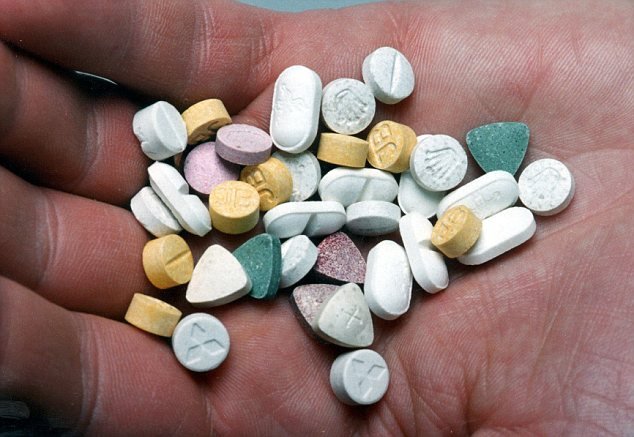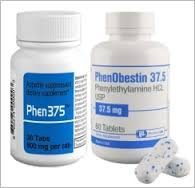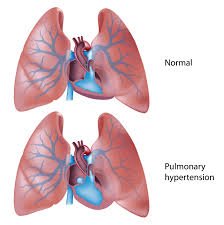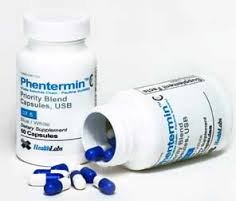




Side Effects from Phentermine
Phentermine holds the reputation of being one of the most well-tolerated drugs in the history of weight-loss medicines. The drug causes mild side effects in some patients and usually only when taken inappropriately.

For short-term usage (of up to 90 days), the drug is deemed largely harmless. However, long-term effects of using phentermine can lead to severe complications. Physicians prescribe taking the drug for no longer than 3 months and Americans using phentermine over-the-counter are advised to moderate their dosage and usage.
Common side effects of phentermine
On an average, the side effects of phentermine affect only a small population (one to two percent of total users). The most commonly observed side effects include –
- Headache
- Nausea
- Dizziness
- Irritability
- Mood changes
- Hyperactivity
- Clumsiness
- Confusion
- Restlessness
- Nervousness
- Insomnia
- Increased thirst/dry mouth
- Unpleasant taste
- Rashes
- Diarrhea
- Constipation
- Changes in libido
Essentially minor, these side effects can be managed with ease by altering the dosage or with a combination of diet and exercises.
Rare/occasional side effects of phentermine
In some rare cases, the use of phentermine may bring about the following side effects in patients –
- Stomach ache
- Swelling in ankles or feet
- Hallucinations
- Psychosis
- Panic
- Aggression
- Overactive reflexes
- Increased or decreased blood pressure
- Chest pain
- Heart-valve disorders
- Increased seizure (in epileptic phentermine users)
- Painful withdrawal symptoms after discontinuing use of phentermine
- Impotence
In rare cases, patients may also experience some severe allergic reactions. These may include hives and rashes on the skin, a sensation of congestion in the chest, swelling of the face, itching, redness and wheezing.
Considerations
Patients with known blood pressure and heart-related problems must discuss their condition with a physician before taking phentermine. Those on the drug already must seek immediate medical attention on occurrence of the following symptoms –
- Discomfort/uneasiness in the chest
- Increased heart beat (when the heart feels like it is “pounding”)
- Any breathing problems
- Any swelling in the ankle
- Pain that travels along the length of the arm
- Dizziness
- Tremors
- Change in skin color (skin turns bluish yellow)

Approaching a physician early on noticing these side effects will allow him/her to alleviate/manage the symptoms before they cause major problems. You will also get more information about your body’s response to phentermine. Given that only one to two percent of the total patients using the drug are hit by the symptoms, it is possible that some other medication or lack of proper diet and exercise may have caused the symptoms in the first place. Your doctor will also be able to help you manage the side effects and prevent them from occurring again.
Side Effects & Precautions of Phentermine
Losing weight and keeping it off could be one of the hardest challenges faced by a person in their life. It becomes even more difficult when you need to curb your appetite as well. According to the American Heart Association (AHA), there are nearly 155 million people in the United States over 20 years of age who are categorized as obese or overweight. This means that keeping a check on one’s diet has become extremely critical in order to stay fit and enjoy a long and healthy life, devoid of any serious medical problems.
Many people resort to medical intervention such as oral drugs when trying to lose weight. This is especially true for those who are excessively overweight. Phentermine is actually the generic name for drugs such as Adipex-P, Ionamin and Suprenza, which have been developed especially for weight loss. It helps in suppressing appetite and encourages faster calorie burning in the body. This appetite suppressant (similar to amphetamine) basically works by affecting a person’s central nervous system.
Phentermine is generally used in conjunction with a doctor’s program that covers diet, exercise and behavioral change. This drug is considered to be helpful for those who are placed in the category of ‘obese’ people or suffer from various weight-associated medical conditions. Doctors and medical experts are of the opinion that weight loss and maintenance can help reduce the numerous health risks related to obesity. These primarily include high blood pressure, diabetes and heart disease.
Classification of Phentermine
Phentermine, the drug that promises to get you from fat to fit, is placed in the Schedule IV category of drugs. The United Nations International Narcotics Control Board informs the users of Phentermine that ‘anorectic’ drugs such as Phentermine could be easily addictive, especially among women obsessed with losing weight and becoming thin.
According to an article that came out in the popular Yonsei Medical Journal, Phentermine is the most common weight-loss drug prescribed by all doctors who specialize in treating obesity. Although the drug is approved for short-term usage only (e.g. 12 or less weeks), one may notice the potentially serious side effects upon primary use.

Dosage: How to use Phentermine
Phentermine is an oral medication (taken through the mouth) which is typically taken once a day (or as per the directions given by your doctor). Phentermine can be bought in the form of regular, orally dissolving capsules and tablets in a variety of different strengths. The strength obviously depends on the particular medicine brand. It is generally prescribed at the minimum possible dosage in the beginning. The dosage of Phentermine also largely depends on your body weight and specific condition.
It is recommended that a person consult his/her doctor before taking any brand of Phentermine since dosage and the manner of consuming the medicine varies for different brands. But usually, doctors prescribe taking Phentermine on an empty stomach only. Therefore, it is best consumed an hour prior to eating breakfast or an hour or two after breakfast. In individual cases, a doctor might make alterations to the dosage and prescribe three smaller doses every day to a patient. It is extremely important to follow the doctor’s instructions when taking Phentermine because when taken at irregular times or in incorrect doses, it could lead to problems such as insomnia.
Phentermine is generally prescribed for just a couple of weeks at a go. Those taking Phentermine should not mix it with any other appetite suppressing drug. Extended use of the medication and mixing with other weight loss drugs could increase the chances of severe side effects.

Phentermine first got approval as a weight loss drug in the year 1959. Since then, it is being sold in different forms in the market. The Food and Drug Administration (FDA) eliminated a mixed diet drug called‘fen-phen’ (Fenfluramine and Phentermine) since there was proof of it having a damaging effect on the heart valves of an individual. It later approved of Phentermine as a safe, anti-obesity drug.
FDA warns that people suffering from any of the below mentioned conditions should avoid the use of Phentermine:
- Heart disease
- Glaucoma
- Atherosclerosis (extreme case of arteries getting hardened)
- High blood pressure
- Overactive thyroid
- Behavioral problems such as feeling highly agitated, jittery or irritable
- Diabetes
- Drug abuse history
- Breastfeeding mothers
- Women who are either pregnant or wanting to conceive
The consumption of MAO inhibitors with Phentermine could lead to highly serious drug interaction. You should avoid all MAO inhibitors like isocarboxazid, methylene blue, phenelzine, linezolid, procarbazine, moclobemide, tranylcypromine, rasagiline, selegiline etc. when using Phentermine. Majority of these MAO inhibitors must ideally be avoided for at least two weeks prior to beginning treatment with Phentermine. Always ask your doctor about when to begin or stop the consumption of this medication.
Precaution: Interactions with other Drugs and Substances
As mentioned earlier, Phentermine should not be taken in conjunction with other diet drugs as this can lead to serious side effects. It is critical to inform your doctor/pharmacist about the treatments and medicines that you are currently using. These include OTC (over-the-counter) medications, nutritional shakes, vitamins, weight loss supplements, protein powders, herbal drugs, recreational drugs and any alternative medication.
- Inform your doctor and pharmacist about any drugs which cause you to feel drowsy or dizzy. These typically include certain anti-seizure drugs like carbamazepine, antihistamines like diphenhydramine, medicines for anxiety or insomnia like diazepam, alprazolam etc., narcotic pain relievers and muscle relaxants.
- Your doctor and pharmacist also need to know about any kinds of prescription/non-prescription drugs which you might be using, especially for treating depression (SSRIs and SNRIs like venlafaxine, fluoxetine, duloxetine etc. and TCAs like imipramine) and high blood pressure.
- It is critical to check all medication labels including cough/cold products which contain decongestants like pseudoephedrine and diet aids like phenylpropanolamine. These might contain certain ingredients which could cause your blood pressure or heart rate to rise up.
Below is a list of drugs which could interfere with Phentermine:
- Dopamine
- Epinephrine
- Isoproterenol
- Norepinephrine (Levophed)
- Phenylephrine injection
- Linezolid (Zyvox)
- Ephedrine
- Venlafaxine (Effexor, Effexor XR)
Alcohol and Caffeine Interaction with Phentermine
Doctors inform that it isn’t suitable for patients taking Phentermine to consume alcohol (and medicines which reduce or dull the activity of the nervous system). This can interfere with the desirable effects of the medication. In addition to this, the combination of alcohol and Phentermine could also cause you to experience certain side effects like diarrhoea and other stomach problems.
As far as the consumption of caffeine is concerned, it could also heighten the side effects of Phentermine. It is best to

avoid having large quantities of beverages that contain caffeine (tea, coffee, colas etc.) and eat limited amounts of caffeine-containing foods such as chocolates.
Other Precautions for Phentermine Use
- It is extremely important to keep contact with your doctor on a regular basis and inform them about your progress while taking Phentermine. This will ensure that the medicine is fact doing its job and not causing any unnecessary side effects.
- Phentermine is not suitable for use by pregnant women as it could potentially harm the fetus. Also, in case you have conceived while still taking the medicine, it is advisable to inform your doctor about it immediately and discontinue the medicine.
- The medicine could have an impact on your blood sugar levels. Those suffering from diabetes might notice changes in their urine or blood sugar tests. Make sure you speak with your doctor or healthcare specialist and ask important questions.
- Some people may feel lightheaded or dizzy after consuming Phentermine. This is one of the potential side effects of this anti-obesity drug. As a precaution, you must examine your reactions to the medication before driving a vehicle or undertaking heavy exercises. If your alertness levels are affected by the medicine, you might not be in a state to handle these activities and could potentially harm yourself.
- Phentermine is available in 4 distinct forms: disintegrating tablets, capsules, tablets and extended-release capsules. You must carefully follow all dosage instructions, irrespective of the form being used. For example, the doctor might tell you that a disintegrating tablet can be taken with food or without food. It is important to dry your hands before you touch the tablet. The tablet needs to be immediately placed on your tongue once it is removed from its bottle. The tablet should quickly melt and swallowed or taken in with a small sip of water. The extended-use tablet needs to be swallowed completely, in one go. You cannot break, crush or chew this tablet.
- All those consuming Phentermine need to closely follow their doctor’s instructions with regards to regular exercise and a restricted-calorie diet plan. The medicine might not have the desirable effect if you fail to do so.
- In order to avoid any problems related to sleeping, it is best to consume the final dose for the day approximately four to six hours prior to bedtime (or as prescribed by your doctor).

Phentermine Overdose
In case of overdose of Phentermine, an individual must immediately get in touch with an emergency room or poison control center. Those residing in the United States may call 1-800-222-1222 to connect with the nearest poison control center. The residents of Canada could connect with a local poison control center as well. Some of the vital symptoms associated with overdose of Phentermine might include
- Unusual restlessness
- Rapid breathing
- Chest pain
- Irregular heartbeat
- Loss of consciousness
- Seizures
- Hallucinations
In case a person misses out on taking a dose, they can take it whenever they come to remember about it. But if it is very close to the time of your next dose, it is best to skip it and stay with your original dosing schedule. It isn’t recommended to catch up by taking a double dose.
Common Side Effects of Phentermine
If an individual experiences any of the below mentioned side effects associated with the consumption of Phentermine, he/she must not ignore them else it could lead to serious harm in the future (and with continued intake of medication). The side effects to look out for include:
- Dry mouth
- Dizziness
- Irritability
- Difficulty in sleeping
- Diarrhea/Constipation
- Vomiting
- Nausea
It is important to understand that doctors prescribe Phentermine as they have analyzed that the benefits of the medication for an individual are greater as compared to the risks of any side effects. Also, there are numerous people who have been using this medicine consistently and haven’t reported any severe side effects.
Severe Side Effects of Phentermine
While dry mouth, dizziness, nausea, vomiting etc. are the more common and less serious side effects of Phentermine, there are certain severe potential side effects of the medication which require immediate medical intervention and contact with your doctor. These include:
- Extremely fast heartbeat
- Arm, chest or jaw pain
- High blood pressure
- Swelling in legs or feet
- Trembling or shaking
- Shortness of breath
- Rash, skin redness or itchiness
- Fatigue, weakness and problems in walking

You should also inform your doctor if you notice signs like an upset stomach, insomnia, changes in sexual behaviors/desires such as erectile dysfunction, inability to think, hives, unusual feelings (e.g. dysphoria, extra sensitivity etc.) and addiction to the medication among others.
You must discontinue taking the medication and consult your doctor immediately if you experience these rare, yet serious side effects of Phentermine-slurred speech, vision changes, seizure, weakness or inability to move one side of your body, severe headache etc.
Individuals have rarely reported any serious allergic reactions to Phentermine. But it is vital to consult your doctor immediately if you experience the signs of a severe allergic reaction. These include rash, swelling/itching (particularly in face, throat and/or tongue), troubled breathing or extreme dizziness.
Phentermine has rarely been reported to cause severe or fatal heart and lung related problems (heart valve conditions, hypertension). There is an increased risk with extended use or if it is combined with other appetite suppressing drugs and products. In relation to heart and lung problems, consult your doctor immediately if you experience the following side effects:
- Difficulty in breathing during exercise
- Chest pain
- Fainting
- Reduced stamina to exercise
- Swelling in legs, feet and/or ankles
Pulmonary Hypertension
A study done by researchers that came out in the Yonsei Medical Journal analyzed the potential link between anorectic drugs and pulmonary hypertension. It reports about a 29 year old woman who was taken into emergency as she was experiencing shortness of breath. She was diagnosed with a condition called pulmonary hypertension.
The researchers involved in the study revealed that 3 months prior to the emergency admittance, the woman had taken Phentermine for 5 weeks. This could offer a potential link between the pulmonary hypertension condition and the drug i.e. Phentermine. Later it was reported that the woman’s symptoms started to improve with progressive treatment. There is still more research that needs to be done to closely analyze the drug’s potential effects under variable doses.

Some of the side effects associated with Phentermine might not require any medical attention. This is because these side effects tend to reduce and even disappear as treatment progresses since your body slowly gets adjusted to the medication. In addition to this, your doctor or healthcare professional might inform you about the different ways in which you can avoid or minimize certain common side effects of Phentermine.
The above mentioned list of the potential side effects of Phentermine isn’t complete. Any other side effects that aren’t mentioned above might also need medical intervention.
Phentermine Drug Abuse
As mentioned earlier, Phentermine is a habit-forming stimulant which can be misused by some people in order to get high (by consuming very large doses). When Phentermine is consumed for an extended period of time or in dosages higher than what is prescribed by the doctor, it can lead to dependency. Ultimately, the individual could develop fatigue and depression once they discontinue the use of this drug.
Detailed Instructions about Phentermine Dosage
As mentioned earlier, the quantity of medicine taken by an individual usually depends on the brand used, i.e. the strength of that particular brand of Phentermine. In addition to this, the count of doses taken each day, the time period for which the medicine is taken and the time gap in-between doses depends on your specific medical problem, i.e. your reason for taking the drug.
Treating obesity with Phentermine
Here are some general guidelines for Phentermine consumption when treating obesity:
Oral dose (capsules)
- Adults and teens (Age: 17 years or older): 15 to 30 mg taken once a day, about two hours post breakfast.
- Children (Age: 16 years or younger): Not suitable for consumption by this age group.
Oral dose (disintegrating tablets)
- Adults and teens (Age: 17 years or older): One tablet taken once a day, in the morning.
- Children (Age: 16 years or younger): Not suitable for consumption by this age group.
Oral Dose (extended-release capsules)
- Adults and teens (Age: 16 years or older): One capsule taken once a day, either before breakfast or ten to fourteen hours prior to sleeping.
- Children (Age: 15 years or younger): Not suitable for consumption by this age group.
Oral dose (tablets)
- Adults and teens (Age: 17 years or older): 18.75 to 37.5 mg, taken once a day, either before breakfast or one to two hours post breakfast.
- Children (Age: 16 years or younger): Not suitable for consumption by this age group
All forms of Phentermine should be stored in a properly closed container and at room temperature. The tablets or capsules need to be kept away from moisture, direct light and heat. Do not refrigerate the medicine and store it away and out of the reach of your children. Avoid stalking expired medicines or those which you no longer use. Also consult your healthcare professional regarding the correct disposing off method for the medicines you don’t use anymore.
Phentermine History and Brands
The FDA approved the use of Phentermine in 1959 and it started being used as an appetite suppressant drug in the same year in the United States of America. It was available as Phentermine resin at first and in the 1970s; it started selling as Phentermine Hydrochloride.
Earlier, it was being sold by the name of Fastin® (manufactured for SmithKline Beecham by King Pharmaceuticals) but it was withdrawn from the market in 1998.
At present, Phentermine is sold under a variety of different brands that vary across nations. The most popularly known brand of Phentermine is Adipex-P®. It is manufactured by a company called Gate Pharmaceuticals.
You can also find Phentermine as a generic medication since it is produced by several different pharmaceutical firms with unique appearances. This basically helps in creating a distinction between manufacturers. Users have the option to consume Phentermine in the tablet or capsule form. They can also buy orally disintegrating tablets of Phentermine which are typically sold under the Suprenza® brand name. There is plenty of information available on the internet regarding the specific brands of Phentermine.
Phentermine essentially causes your brain to create stimulation in the adrenal glands in order to release norepinephrine. This is a neurotransmitter that signals a fight-or-flight response and helps in reducing hunger. In addition to this, Phentermine also releases two other chemicals, dopamine and serotonin, though in much lesser quantities as compared to norepinephrine. The release of these chemicals helps in creating a feeling of satiation in the individual and reduces cravings.
Conclusion
In conclusion, let’s go back to from where we first started the discussion on Phentermine. The most popularly prescribed anti-obesity medication in the United States; Phentermine has been used for several years by those attempting to lose extra weight. But beyond America, the use of this drug in other countries is found to be restricted because of the numerous misapprehensions about Phentermine safety.
There has been concern regarding adverse cardiovascular reactions induced by Phentermine as well as Phentermine-related addictions. In fact, these are largely the two biggest fears associated with the use of the drug and have had a profound effect on its prescription globally.
Even though the FDA (Food and Drug Administration) has included warnings related to the psychiatric and adverse cardiovascular effects of Phentermine in the label of the drug, the rare clinical reports which are published in the industry medical literature about such serious affects are unreliable and based mainly on hearsay.

But the opinion about Phentermine and its administration has undergone change in the last few years. Numerous obesity specialists are disregarding old misapprehensions and prescribing Phentermine to patients. According to a survey done in 2008, 98 percent of specialists prescribing bariatric medicines made use of pharmacotherapy when dealing with obesity. Also, 97 percent of them prescribed the consumption of Phentermine as the preferred treatment for weight loss.
Phentermine (Phentermine resin 15 to 30 mg/day or Phentermine HCl 37.5 mg/day) has undergone evaluation as a mono-therapy in numerous studies conducted over a period of 36 weeks. These studies showed reductions in waist circumference and body weight as well as faster achievement of a minimum of 5 to 10 percent weight loss in relation to placebo.
In 1968, the British Medical Journal came out with a study on weight loss using Phentermine mono-therapy (dosage: 30 mg per day) for a period of 36 weeks. The participants in the study were obese and overweight women (double-blind trial). It was found that Phentermine caused a significant amount of average weight loss per month for both groups i.e. the group that took the drug consistently for the stated number of months and the group which took the drug after every alternate month.
What about the Phentermine addiction?
As discussed earlier, there is some far regarding the addiction potential of the Phentermine drug and this has previously

discouraged its prescription as well. When Phentermine got approved by the FDA in 1959, there were expectations that it might end up being addictive, even if not with the same intensity as amphetamine. This prediction was made because amphetamine and Phentermine had similarities in their chemical structure. Also, there was evidence that upon being tested on rats, Phentermine encouraged spontaneous activity. There was no evidence to suggest that the same drug was potentially addictive for human beings in the clinical studies that were conducted before the FDA approval.
Phentermine is an effective and safe weight-loss drug, if taken under the proper guidance of a doctor or healthcare professional. The patient must be aware about all the necessary precautions and potential side effects of the drug before its administration.
Phentermine could help you shed pounds in a short period of time. However, once you discontinue its use, you are at risk of regaining the weight you originally lost. This is the reason health experts say that Phentermine should not be the primary approach to losing weight. It works best when used in combination with a healthy diet and regular exercise.







